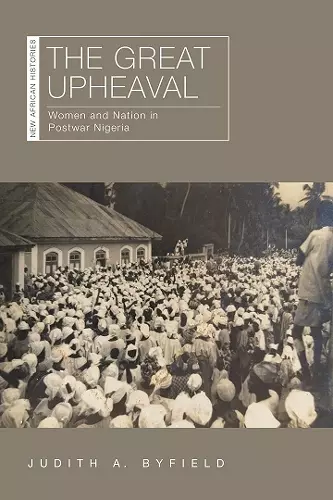The Great Upheaval
Women and Nation in Postwar Nigeria
Format:Paperback
Publisher:Ohio University Press
Published:4th Jan '22
Should be back in stock very soon

This social and intellectual history of women’s political activism in postwar Nigeria reveals the importance of gender to the study of nationalism and poses new questions about Nigeria’s colonial past and independent future.
In the years following World War II, the women of Abeokuta, Nigeria, staged a successful tax revolt that led to the formation first of the Abeokuta Women’s Union and then of Nigeria’s first national women’s organization, the Nigerian Women’s Union, in 1949. These organizations became central to a new political vision, a way for women across Nigeria to define their interests, desires, and needs while fulfilling the obligations and responsibilities of citizenship. In The Great Upheaval, Judith A. Byfield has crafted a finely textured social and intellectual history of gender and nation making that not only tells a story of women’s postwar activism but also grounds it in a nuanced account of the complex tax system that generated the “upheaval.”
Byfield captures the dynamism of women’s political engagement in Nigeria’s postwar period and illuminates the centrality of gender to the study of nationalism. She thus offers new lines of inquiry into the late colonial era and its consequences for the future Nigerian state. Ultimately, she challenges readers to problematize the collapse of her female subjects' greatest aspiration, universal franchise, when the country achieved independence in 1960.
“Byfield has written a meticulously documented history of women’s political activities during the first half of the twentieth century. The women of Abeokuta played a leading part in the history of economic change, nationalism, and eventual independence in colonial Nigeria, and Byfield’s study is a welcome addition to scholarly analysis of political and economic transformation in Nigeria and Africa in general during this crucial period.” - Sara Berry, professor emerita of history, Johns Hopkins University “The Great Upheaval is a brilliant historical sociology of the gendered struggle for ‘a new philosophy of life’ in a colonial context. Judith Byfield reminds us that the erasure of women and gender in nationalist histories of emancipation in Africa diminishes our understanding of the complexity of ‘nation-building,’ including the contradictions of gendered notions of agency and freedom. The author seamlessly interweaves gender and nation with colonial history and political economy in the analysis of how Abeokuta women expanded the vistas of human possibilities in early- to mid-20th century Nigeria.” - Wale Adebanwi, Presidential Penn Compact Professor of Africana Studies at the University of Pennsylvania “Competent, coherent, and captivating, Judith Byfield combines the values of deep research with deep thinking to extend the frontiers of knowledge on gender politics in postwar Nigeria’s late colonial period. City, national, and global ideas converge in The Great Upheaval to locate Yoruba women in complex intersections of economy, politics, and race.” - Toyin Falola, Jacob and Frances Sanger Mossiker Chair in the Humanities, the University of Texas at Austin “Judith Byfield has not only shown that women in Abeokuta played important parts in struggles against colonialism and for better social conditions, but that focusing on gender forces us to rethink histories of kingship, urban life, trade, taxation, religion, protest movements, and memorialization-indeed, the entire history of the region and its relationship to Nigeria.” - Frederick Cooper, author of Citizenship, Inequality, and Difference: Historical Perspectives “[A] brilliant book…. Highly recommended.” - T. O. Falola (Choice)
ISBN: 9780821423981
Dimensions: unknown
Weight: unknown
334 pages